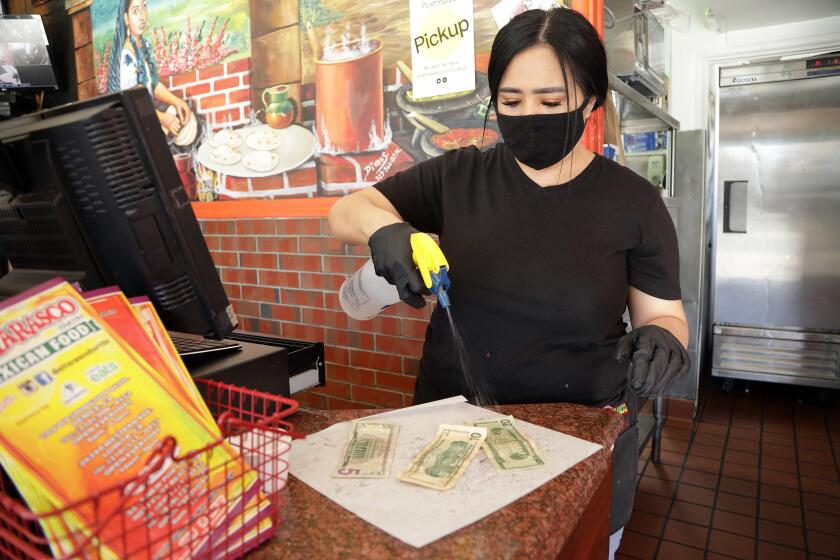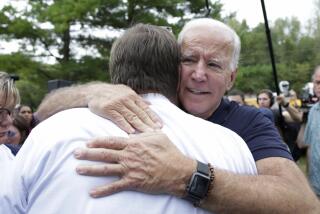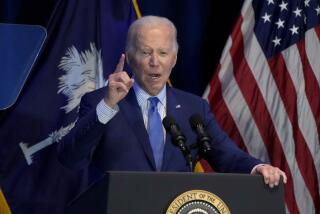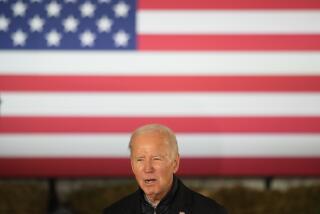Economy in shambles, Trump scrambles for new 2020 message
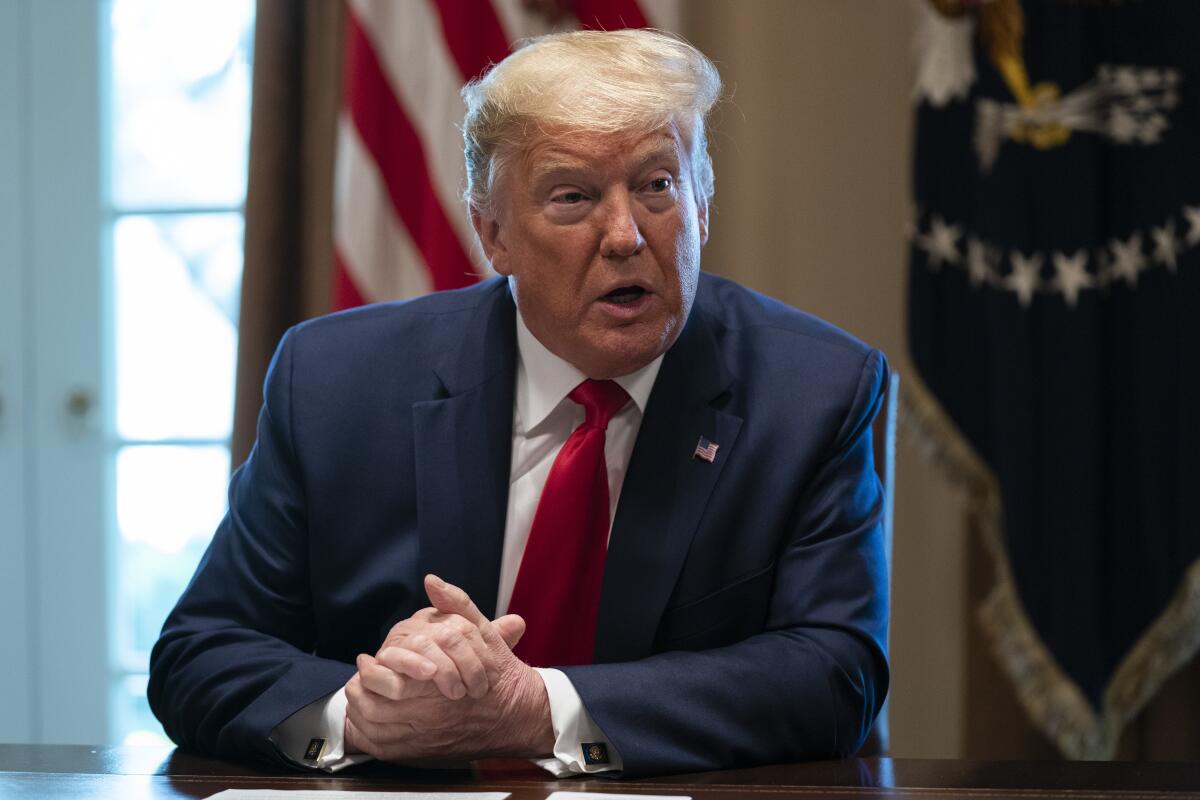
When President Trump battled impeachment early this year, his reelection campaign staff blasted out Facebook ads, texts and emails to donors and supporters, arguing that he was delivering gonzo job figures and a soaring stock market in the face of bitter partisan obstruction.
Those ads drew Trump’s highest audiences on Facebook, his campaign’s chief advertising platform, which it has used to test out thousands of messages and images since the 2016 election.
Now with the nation’s economy reeling, more than 10 million Americans out of work and the stock market plummeting 30%, Trump and his aides are struggling to find a new message he can take to Americans for the November election.
“Five weeks ago, it was all going to be about this amazing economic machine that we had built,” said Stephen Moore, an economic advisor to Trump’s 2016 campaign who remains in contact with the White House. “It seems like 100 years ago.”
So far, at least, Trump’s campaign has not directly mentioned the COVID-19 pandemic in its Facebook ads. It is test-marketing a handful of ads that only vaguely allude to it, casting Trump as a unifying leader for a “nation facing uncharted territory.” One says Trump is uniquely suited to keep the country “SAFE.”
Whether voters agree with that argument, and how they view his competence in battling the coronavirus outbreak and reviving the ravaged economy, will probably determine his political fate, overwhelming other judgments about his rocky tenure in office. Polls show he faces widespread concern that he mismanaged the government’s early response.
After weeks of downplaying the coronavirus crisis, Trump cast himself as a “wartime president” in mid-March, recommended drastic social distancing measures and signed the country’s largest-ever stimulus package. During his nightly news conferences, he went from rosy projections of a quick turnaround to grim-faced warnings of 100,000 to 240,000 American deaths and a deep economic recession, if not worse.
Larry Kudlow, Trump’s top economic advisor, said Friday that the 10 million jobless claims filed in the last two weeks don’t fully reflect the economic pain. Kudlow, who had spent weeks suggesting the stock market crash offered investors a chance to buy on the cheap, conceded that hardships will “get worse before they get better.”
In response to another bleak jobs report Friday, Trump’s campaign promised relief for small businesses and workers in the $2-trillion stimulus bill passed by Congress, even though the initial rollout of $350 billion in loans for small businesses was mired in confusion and delays.
It also accused former Vice President Joe Biden, the likely Democratic presidential nominee, of “useless partisan sniping from the sidelines.” Since the crisis worsened, Biden has been forced to run his campaign from the basement of his home in Wilmington, Del.
Biden’s campaign called Friday’s job report, which said the economy shed 701,000 jobs in March, sending the unemployment rate to its sharpest one-month rise since 1975, a “flashing red light” and said that Trump needs to push another stimulus package to stop the economic bleeding.
Other red lights are flashing for Trump’s campaign, however.
After embracing national guidelines for social distancing in mid-March, Trump’s approval ratings for his handling of the crisis began to climb. But a poll released Friday by ABC News and Ipsos showed a decline from 55% three weeks ago to 47%.
Several governors, especially those who issued stringent stay-at-home orders, saw their poll numbers jump.
“Governors have been seen as more clear and decisive about their actions, and they’ve gotten a lot of credit,” said Charles Franklin, who conducts a monthly tracking poll for Marquette University in Wisconsin, a crucial state for Trump’s reelection prospects. “Trump has been less consistent in his rhetoric about how we should think about the crisis, but the consequences of those actions are less clear.”
Wisconsin Gov. Tony Evers, a Democrat, wins high marks for his handling of the epidemic from three-quarters of the state’s voters, for example. Trump’s handling rates well with just over half of Wisconsin voters, according to Franklin’s poll.
Some of that difference may be the result of Trump’s divisive rhetoric, which has helped him maintain a solid core of support, but has prevented him from winning over Democrats and independents throughout his presidency.
“Attitudes about the president are deeply ingrained, both positive and negative,” said Whit Ayres, a Republican pollster. “So there is a powerful tendency to view the president’s performance through the preexisting lens.”
Trump has done best in polling when he has spoken realistically about the threat — as when he introduced the social distancing guidelines last month and when he extended them on Monday until April 30, with a painful assessment of the potential death toll.
Los Angeles Times’ visual coverage of the coronavirus crisis
“The more his briefings are like Sgt. Joe Friday — just the facts — the stronger he is,” said Neil Newhouse, a Republican pollster, a reference to the old “Dragnet” series.
“My advice is to be realistic — to describe things as they are, not as a salesman — and the more realistic he is, the more reassuring he can be,” said Ari Fleischer, former press secretary for President George W. Bush. “If there’s a problem, point it out in a nonaccusatory manner and explain how you’re going to fix it.”
Trump has done that on rare occasions. But in many tweets and public appearances, he has lashed out at governors for demanding too much and not being “appreciative” enough — even as their hospitals and morgues overflow — and suggested he might divert resources to those who say nice things about him.
He has denied responsibility for widespread testing problems, falsely insisting any American who wanted a test could get one. And instead of using his authority to coordinate a unified response, he had told states to solve their own supply problems, leading to a Darwinian fight for test kits, ventilators, masks and other critically needed medical gear.
Some Republicans believe voters will forgive or forget Trump’s many statements downplaying the danger, his boasts that infections were under control, and his repeated claims, as recently as a week ago, that COVID-19, the disease caused by the virus, was no worse than the flu.
Both Biden’s campaign and Priorities USA, the main Democratic super PAC, have launched TV and digital ads in swing states featuring Trump’s early expressions of nonchalance about the coronavirus.
Tim Miller, a Republican strategist who worked on former Florida Gov. Jeb Bush’s failed 2016 presidential campaign and has become a vocal critic of Trump, said Democrats can argue that Trump not only dismissed the danger with his rhetoric, but also failed to act swiftly enough on the information he had.
“The timeline here is critical, because this is such a slow-moving disaster,” Miller said. “There’s this flattening of time with us all stuck in our homes, and people are open to the idea that everyone was caught by surprise and came to it late, and that’s not the case.”
He cited a Feb. 5 tweet from Sen. Christopher S. Murphy (D-Conn.), who concluded after leaving an administration briefing that Trump’s team “isn’t taking this seriously enough.”
“There has to be no mistaking the fact that the Trump administration knew this was coming, knew enough to brief the Hill, and yet the president failed to act when it would have really mattered,” Miller said. “The Democrats’ challenge is making this as clear as possible, and it’s a lot harder, politically, than just clouding things up and making it seem like everyone is just as guilty as he is.”
More to Read
Get the L.A. Times Politics newsletter
Deeply reported insights into legislation, politics and policy from Sacramento, Washington and beyond. In your inbox three times per week.
You may occasionally receive promotional content from the Los Angeles Times.
